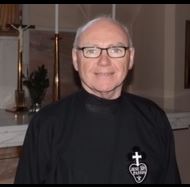A few years ago, while I was still based at Mount Argus in Dublin, I was in the middle of a meeting with our accountant when he suddenly took ill with an angina attack, and we had to phone an ambulance. The ambulance came quickly and it was agreed that I would follow behind the ambulance to St. James’s Hospital. He gave me his car keys and asked me to get his coat and bring it with me, and also to phone his son and let him know. I went to my room, phoned his son, and came down to where his car was parked. It was a fancier car than anything I had ever known, and when I pushed a button on his key fob, expecting it to unlock the car doors, it put the lights on inside the car instead, and the doors remained locked. With some uncertainty I used the key, but as soon as I opened the driver’s door the alarm started to go off. I grabbed his coat from the back seat and closed the door again, but still the alarm continued and grew even louder. Then all the lights began to flash as well. I stood there looking at it, wondering what to do next. Passers-by looked at me suspiciously and I began to feel irrationally guilty, even more so when a police car came along. Thankfully it was the police who helped me to switch the alarm off and get on my way.
I was reminded of this because of another car incident we had this past week. Last Monday, around 2.30 p.m., someone phoned the office to tell me that a car had parked across the gates into our yard at St. Mungo’s so that no one could either get in or get out. When I went down to see what was happening I found three members of staff from the St. Mungo’s Old Folks Centre for Wellbeing and one member of staff from AGAP (Archdiocese of Glasgow Arts Project) wondering how they were going to get home, as their cars were parked in the yard, and indeed two of them were wondering how they were going to collect their children from school. I was also wondering how I was going to get out myself, as I had an appointment to get to later in the afternoon. We had no choice but to phone the police and the traffic wardens who attend the local parking meters.
The traffic warden came first and took photos of the car, the “Keep Clear” signs; the “No Loading at any Time” sign, and the double yellow lines, then slapped a ticket on the car. He then phoned for a tow truck, only to inform us that none would be available that day, so we would have to wait for the driver to come back – God knows when. He left, and a little while later the police came. They said they would have a tow truck within half an hour. During that time Father Gareth arrived and we swapped cars so I could get to my appointment. Later on, I discovered, the tow truck came as promised and took the car off to the pound.
The final episode was some hours later, when Father Gareth set out for home at 8.45 p.m., having returned from Youth 2000 in St. Andrew’s Cathedral. As he drove out of the gates a woman jumped in front of the car so that he had no choice but to slam on the brakes, even though the gate was closing behind him and ended up scratching the back of the car. She demanded to know where the car was that had been parked there. When Father Gareth informed her that she had parked illegally and that the police had towed it away, her only concern seemed to be how much it would cost to get it back; there was certainly no remorse, and no apology for any trouble she had caused by what could only be described as a very selfish and irresponsible act, but before any of that could be said to her, she walked away.
The Gospel that day (Luke 18:35-43) showed Jesus healing a man who was blind. Perhaps that lady needed to be healed of her blindness; of her inability to see the selfishness of her actions. “What do you want me to do for you”, said Jesus? “Lord, that I may see”. We might also want to reflect on Matthew 7:12, the Golden Rule: “Do unto others what you would have them do unto you”. Why not take a moment some time to pray, and ask the Holy Spirit how you might exercise this teaching in your own life, and where might it be lacking?

 RSS Feed
RSS Feed
